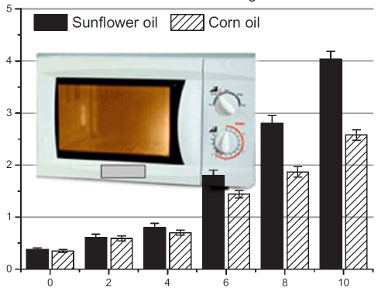In microwave ovens, oscillating electric fields of a specific frequency induce the vibration of polarized molecules such as water, thereby creating heat. Microwave heating is hampered by inhomogeneities in the food, because the locally generated heat caused by absorbed microwaves cannot dissipate fast enough. In order to overcome this flaw and to heat the food more uniformly, microwave ovens use dissipation pauses, where the microwaves stop and the heat is able to spread through the food.
Stefan Schmidt and his colleagues, Slovak University of Technology, Bratislava, Slovak Republic, analyzed the effect of the dissipation pause length on the quality of vegetable oil by comparing two ovens, one of which uses 30 % of the heating time for dissipation, whereas the other only uses 10 %. They found that oil heated in the oven with a longer dissipation pause has a three times lower peroxide value, three times less dienes and aldehydes and the degradation of vitamin E is almost two times lower compared to the oven with shorter dissipation times.
This shows that degradation of vegetable oil can be reduced by using longer dissipation times making microwave heated food healthier.
- Chemical changes in microwave heated vegetable oils
František Kreps, Lenka Vrbiková, Štefan Schmidt, Stanislav Sekretár, Ondrej Híreš
Eur. J. Lipid Sci. Technol. 2014.
DOI: 10.1002/ejlt.201400047




